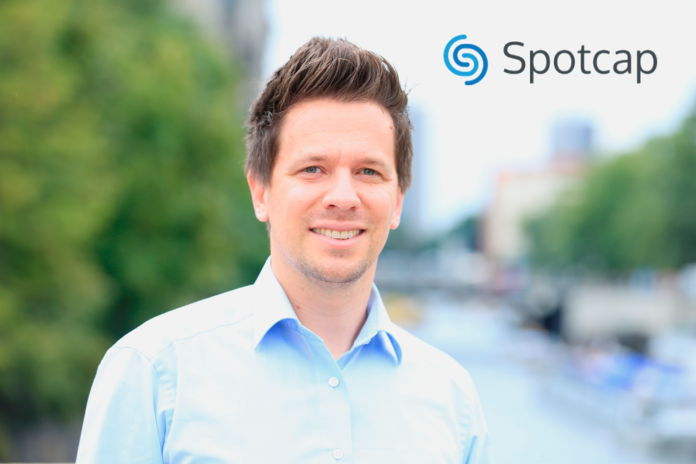Will rising tides (interest rates) catch some lenders unprepared and leave the players with better technology, credit risk management and multiple-business-models in a better position?
I recently had the chance to interview Jens Woloszczak, Co-founder and CEO Spotcap at the NOAH Conference in London. Spotcap is a German fintech company started in 2014 as a innovative on-balance sheet SME lender. The startup is backed by Rocket Internet, Access Industries, and others, and secured over €100 million in funding. The latest funding round was in October, when Spotcap raised additional €22 million to accelerate growth.
Today, Spotcap operates in five countries and has recently been ranked number 32 in the Fintech 100 report featuring leading companies in the fintech industry worldwide, published by H2 Ventures and KPMG. Here is a summary of my interview with Jens Woloszczak:
How do you compare peer to peer models with on-balance sheet models?
Peer to peer emerged for UK and US investors as there was demand from the investor side. In Germany, the retail asset class is not as developed.
Speed is important, but the usual decision process of banks can take up to 8 weeks. Peer to peer can take about 1-4 weeks. As an on-balance sheet lender, we can fund within 24 hours. Peer to peer models have less skin in the game and are more focused on origination.
Interest rates are going up. Who will survive?
I think two types of players will survive. First, those who are large and relevant enough to be able to sustain standalone lending. Second, those with strong technology and credit-risk management. Compared to peer to peer lenders, our loan book turns around more quickly, so we would be able to manage risk quicker.
As Spotcap, we have done 150 million in credit lines over 3 years. We have built a state of art credit platform, which enables us to offer and run multiple services, we can white label our platform. We are already in advanced talks with 2 players for such a partnership. We see that banks can customize and brand our platform and we provide the platform and let them run it. In essence, our business is now evolving in two lines, direct lending and lending as a service.
How does your technology work?
Our credit scoring algorithm doesn’t rely solely on traditional data but more on bank account transaction data and credit bureau information. For instance, for up to €50K loans, we can offer a lighter application process. For loans up to 12-15 months, focus is on liquidity risk, up to 2-3 years, on insolvency risk. The borrower can also upload their bank PDF statements and our system can process that as well, extracting the data from those documents and mapping it onto our system.
What types of loans and customers do you focus on?
We focus on loans from €10-250K. Approximately 60% of our customers have €2 million turnover each year. They have bank lines but often require extra working capital. The pricing of the loans come at a slight premium to bank rates but our customers like and use our offering as it is fast, ensured, faster, requires no personal guarantees, flexible around repayment terms and has no early repayment penalties. Our loans can go up to 15 month maturities.
How does Brexit impact you?
We obtained a FCA licence a year ago and needed a local licence for the UK anyways.
But the Brexit has not had a large impact on our business to date. Despite economic uncertainty post-Brexit, the UK remains robust, and London is Europe’s fintech home. We launched in the UK in a post-Brexit environment because we believed, and still believe, that Britain is ‘open for business.’ The underlying dynamics of the economy are unchanged and capital will be needed to make the most of opportunities in turbulent times.
We do believe London will remain the fintech capital of Europe, but should be wary of increased competition from European cities which are poised to surge in the coming years.
What is next for Spotcap?
Our next goal is to get the whitelabel solution up and running and launch one more such partnership, do one more financing round and double origination in 2018. We may also open up to new countries.
UK is a strong and growing market for us. It will be our biggest market. We plan to catch up with mid-tier players with white-label and distribution partnerships.
US is a very big market but it is quite mature and each state has different regulations. China is super crowded but there may be an opportunity for Korea, Malaysia, Singapore in the medium term.
How about exits for this sector?
We may see IPO’s from biggest players. We may than see some acquisitions from banks and strategic investors, i think this would take several years.




